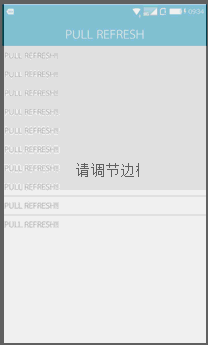《转》ACTIONBAR-PULLTOREFRESHLIBS+沉浸式在部分手机上的布局错乱,目前知道的三星系统(TouchWiz)
Posted on 2015-04-10 15:09 阿祥当码农 阅读(1516) 评论(0) 收藏 举报转载:http://www.cnblogs.com/wubingshenyin/p/4413672.html(原文连接)
前段时间看见ActionBar-PullToRefreshLibs用来刷新很好看,配合4.4以上支持的沉浸式效果更佳,于是便想配合沉浸式+ActionBar-PullToRefreshLibs做出一个效果,在自己的大神F2手机上看见没有问题,但是在三星note3上却出现了下拉actionbar刷新和actionbar错位的情况,非常郁闷。通过调试ActionBar-PullToRefreshLibs发现状态栏在设置沉浸式的时候在三星机器上的高度被抹了(rect.top=0),于是手动修改了ActionBar-PullToRefreshLibs的内部方法(PullToRefreshAttacher类中),实现了部分机器上的沉浸式+ActionBar-PullToRefreshLibs效果。修改原理是判断rect.top是否为0,如果为0就手动获取状态栏的高度给rect设置top,修改代码如下:
protected void addHeaderViewToActivity(View headerView) { // Get the Display Rect of the Decor View mActivity.getWindow().getDecorView() .getWindowVisibleDisplayFrame(mRect); if (mRect.top == 0) mRect.top = getStatusBarHeight(mActivity); // Honour the requested layout params int width = WindowManager.LayoutParams.MATCH_PARENT; int height = WindowManager.LayoutParams.WRAP_CONTENT; ViewGroup.LayoutParams requestedLp = headerView.getLayoutParams(); if (requestedLp != null) { width = requestedLp.width; height = requestedLp.height; } // Create LayoutParams for adding the View as a panel WindowManager.LayoutParams wlp = new WindowManager.LayoutParams(width, height, WindowManager.LayoutParams.TYPE_APPLICATION_PANEL, WindowManager.LayoutParams.FLAG_NOT_FOCUSABLE | WindowManager.LayoutParams.FLAG_NOT_TOUCHABLE | WindowManager.LayoutParams.FLAG_LAYOUT_IN_SCREEN, PixelFormat.TRANSLUCENT); wlp.x = 0; wlp.y = mRect.top; wlp.gravity = Gravity.TOP; // Workaround for Issue #182 headerView.setTag(wlp); mActivity.getWindowManager().addView(headerView, wlp); } protected void updateHeaderViewPosition(View headerView) { // Refresh the Display Rect of the Decor View mActivity.getWindow().getDecorView() .getWindowVisibleDisplayFrame(mRect); if (mRect.top == 0) mRect.top = getStatusBarHeight(mActivity); WindowManager.LayoutParams wlp = null; if (headerView.getLayoutParams() instanceof WindowManager.LayoutParams) { wlp = (WindowManager.LayoutParams) headerView.getLayoutParams(); } else if (headerView.getTag() instanceof WindowManager.LayoutParams) { wlp = (WindowManager.LayoutParams) headerView.getTag(); } if (wlp != null && wlp.y != mRect.top) { wlp.y = mRect.top; mActivity.getWindowManager().updateViewLayout(headerView, wlp); } }
添加获取状态栏高度的方法
/** * 获取状态栏高度 * * @return */ protected int getStatusBarHeight(Context context) { int result = 0; int resourceId = context.getResources().getIdentifier( "status_bar_height", "dimen", "android"); if (resourceId > 0) { result = context.getResources().getDimensionPixelSize(resourceId); } return result; }
运行效果图如下:

需要注意的地方:actionbar我没有用开源的第三方组件,也没有用自带的actionbar,而是把隐藏了title在封装的基类中自定义布局的actionbar。


 浙公网安备 33010602011771号
浙公网安备 33010602011771号